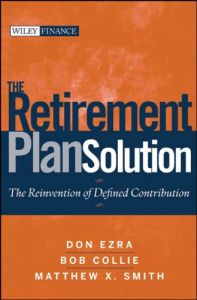Join getAbstract to access the summary!

Join getAbstract to access the summary!
Don Ezra, Bob Collie and Matthew X. Smith
The Retirement Plan Solution
The Reinvention of Defined Contribution (Wiley Finance)
Wiley, 2009
What's inside?
As pension plans change, you must know how to accumulate before you decumulate or you’ll decimate your retirement.
Recommendation
Many American companies have eliminated, or are now eliminating, their defined benefit (DB) pension plans. They are substituting defined contribution (DC) plans, under which employees are primarily responsible for their own retirement savings. Since this is the new lay of the land, you need to know how to assess your DC plan. Focusing on the primary traits of one type of DC plan – U.S. 401(k) pension savings accounts – experts Don Ezra, Bob Collie and Matthew X. Smith explain the latest version-two (or “DC 2.0”) plans. getAbstract recommends this book to human resources (HR) and benefits professionals, retirement plan sponsors and consultants, financial planners, policy makers and all those who hope to retire one day with money from a defined contribution plan. While the book concentrates primarily on U.S. retirement plans, HR professionals from other nations still will find useful retirement planning information here.
Summary
About the Authors
Award-winning author Don Ezra is an investment strategy director for Russell Investments, where Bob Collie is an expert on U.S. and U.K. pension plans. Matthew X. Smith has written about and helped design, implement and administer contribution plans for more than 25 years.
















Comment on this summary